Search results (1695 cards)
Updated: Nov. 4, 2010 (Initial publication: Sept. 9, 2010)
I. Isolated Articles
ENGLISH
Although the industry has faced some difficulties over the past two years, hedge funds play an important role in the global financial system. The benefits these investment vehicles bring to the markets are essentially made possible by flexible and light regulatory regimes. Hedge funds didn’t cause the current crisis, yet there seems to be a consensus among regulators around the world for more regulation: to prevent systemic risk and guarantee investor protection. This paper examines in its first part the relevance of these two arguments. It concludes that although systemic risk may be a legitimate concern, the investor protection argument is questionable. Part II explores what the future of hedge fund regulation could look like. Part III develops the idea that hedge funds do not need more but better regulation (e.g. with costs/benefits analysis, legal framework on a global scale or the creation of a global database for regulators’ use).
FRENCH
Article: Le futur de la régulation des Hedge Funds: une approche comparative: États-Unis, Royaume-Uni, France, Italie et Allemagne
Bien que l'industrie a du faire face à quelques difficultés au court des deux dernières années, les hedge funds jouent un rôle important dans le système financier global. Les bénéfices de ces véhicules d'investissement apportent au marchés sont essentiellement rendus possibles par des régimes régulatoires légers et flexible. Les hedge funds n'ont pas causé la crise actuelle, pourtant, un consensus semble émerger chez les régulateurs du monde pour réguler plus cette activité, cela afin d'éviter le risque systémique et pour garantir la protection des investisseurs. Cet article examine dans un premier temps la pertinence de ces arguments, concluant que la prévention du risque systémique peut être une préoccupation légitime, mais que l'argument de la protection des investisseurs est plus douteux. La deuxième partie de l'article étudie ce à quoi le futur de la régulation des hedge funds pourrait ressembler. La troisième partie développe l'idée selon laquelle les hedge funds n'ont pas besoin de plus mais de meilleure régulation (par exemple avec l'analyse coûts/bénéfices, la mise en oeuvre d'un cadre légal à une échelle globale ou la création d'une base de données globale à destination des régulateurs)
GERMAN
Artikel: die Zukunft der Hedge Funds Regulierung: eine komparative Analyse (Vereinigten Staaten, Grossbritanien, Italien, Frankreich, Deutschland)
Obwohl die Hedge Funds Branche in einer schwierigen Lage in den zwei vorherigen Jahren war, spielen diese Hedge Funds eine wichtige Rolle im globalen finanziellen System. Die Vorteile, die solche Funds mit ihnen ziehen, können erst enstehen dank leichtere Regulierungsbedigungen. Selbst wenn Hedge Funds die Krise nicht verursacht haben, sind die Behörde darauf geeinigt, strengere Regeln durchzusetzen, um dem Verbraucher zu schützen und die Entstehung von Systemrisiken zu vermeiden. Dieser Artikel erforscht im ersten Teil die Gültigkeit solche Argumenten, und zeigt wie die Wirksmakeit der Verbraucherschutz des durch Hedge Funds Regulierung zweifelhaft ist. Dann wird beschrieben, was die Zukunft der Regulierung sein werden könnte. Und endlich wird analysiert, wie die Hedge Funds Branche eher bessere als weitere Regulierung braucht (insb. bessere Aufwand-Nutzen-Analyse, globalen Richtlinien und die Gründung einer globalen Datenbank für die Regulierungsbehörden).
SPANISH
El futuro de la regulación de los fondos de cobertura: Un enfoque comparativo, los Estados Unidos, Gran Bretaña, Francia, Italia y Alemania.
Aunque la industria se ha encontrado con algunas dificultades a lo largo de los últimos dos años, los fondos de cobertura juegan un rol importante en el sistema financiero global. Los beneficios que estos vehículos de inversión fomentan en los mercados son esencialmente posible gracias en gran parte a los regímenes flexibles de la regulación. Los fondos de cobertura no causaron la crisis económica, pero parece existir un consenso general entre economistas abogando por más regulación: para prevenir el riesgo sistemático y garantizar la protección del inversor. Este informe examina en su primera parte dos argumentos. El documento concluye que, aunque la preocupación por el riesgo sistemático puede ser una inquietud legítima, la protección del inversor es cuestionable. La Parte II explora el futuro de la regulación de los fondos de cobertura. La tercera Parte desarrolla la idea que los fondos de cobertura no necesitan de más regulación, sino de mejor regulación (por ejemplo, con el análisis de la relación costo/beneficio, marco legal en escala global o la creación de una base de datos para los reguladores).
Updated: Sept. 25, 2012 (Initial publication: April 11, 2012)
Sectorial Analysis
Translated summaries
The translated summaries are done by the Editors and not by the Authors.
ENGLISH
The 12th General Assembly of the Association of Mediterranean Regulators
for Electricity and Gas (MEDREG) was held at the headquarters of the
Greek Regulatory Authority of Energy (RAE), on 14 December 2011. On this
occasion, members of MEDREG have approved the initial proposals made by
the Task Force devoted to investments in energy infrastructure, aiming
to stimulate investment in the Mediterranean region. The MEDRED also
exercises regulatory powers similar to those of ACER.
FRENCH
La 12ème Assemblée Générale de l’Association des Régulateurs Méditerranéens de l’Electricité et du Gaz (MEDREG) s’est tenue au siège de l’Autorité grecque de Régulation de l’Energie (RAE), le 14 décembre 2011. A cette occasion, les membres de MEDREG ont approuvé les premières propositions émises par la Task Force consacrée aux investissements dans les infrastructures énergétiques, ayant pour objectif de stimuler les investissements dans la région de la Méditerranée. La MEDRED exerce en outre des pouvoirs de régulation analogues à ceux de l’ACER.
Other translations forthcoming.
Updated: Nov. 16, 2010 (Initial publication: Oct. 1, 2010)
I. Isolated Articles
ENGLISH
I would suspect that most regulatory law practitioners—whether they represent government or private interests--feel as if the tidewaters of global regulation have slowly but surely risen within the past few years. Those involved in the fields of competition, environmental or financial law must feel as if the global regulatory waters have reached up to their knees.
FRANCAIS
Article: le G-20 et la régulation économique mondiale: un moyen d'alimenter le développement progressif du droit international?
Je soupçonnerai volontiers que la majorité des praticiens du droit de la régulation - qu'ils représentent les gouvernements ou des intérêts publics - ont le sentiment que les eaux de la régulation mondiale ont monté lentement mais sûrement au cours des dernières années. Ceux qui exercent dans les domaines légaux de la concurrence, de l'environnement ou de la finance doivent eux avoir l'impression qu'elles ont atteint leurs genoux.
GERMAN
Artikel; Die G-20 und die globale wirtschaftliche Regulierung: ein Beitrag zur Entwicklung des internationalen Privatenrechtes?
Ich vermute, dass die meisten Praktiker des Regulierungsrechtes - entweder für öffentlichen- oder privaten Institutionnen arbeitend - das Gefühl haben, dass die Gewässer der globalen Regulierung letztlich langsam aber sicher angestiegen sind. Und diejenigen, die im Bereich Wettbewerb, Umwelt oder Finanz arbeiten, haben sicher das Gefühl, dass die Gewässer schon kniehoch sind.
ITALIAN
Il G20 e la regolazione economica globale: verso l’alimentazione di uno sviluppo progressivo del diritto internazionale?
Direi che la gran parte degli operatori in materia di regolazione normativa – portatori di interessi pubblici o privati – hanno la sensazione che la marea della regolazione economica globale sia, seppur lentamente, sicuramente salita negli ultimi anni. Coloro che operano in materia di diritto della concorrenza, diritto dell’ambiente o diritto finanziario devono aver la sensazione che le acque della regolazione siano arrivate fino alle ginocchia.
CHINESE
二十国集团和全球经济调控:促进国际法前进发展?
我猜测多数的法律规制从业者,无论是代表政府或是私人利益,都感觉到全球化调控的浪潮似乎已经减缓,但事实上其在过去的几年中依然增长。与竞争、环境和金融的相关法律领域很可能已经感到全球化调控的浪潮在与日俱增。
SPANISH
El G-20 y la regulación económica global: ¿alimentando el desarrollo progresivo del derecho internacional?
Yo sospecharía que la mayoría de aquellos que practican la ley – ya sea que representen los intereses públicos o privados – se sienten como si las aguas de la regulación global han aumentado lentamente durante los últimos años. Aquellos que están involucrados en el campo de la competición o las leyes ambientales o financieras ya deben de sentirse como si las aguas de la regulación global les han llegado hasta las rodillas.
Related articles
June 23, 2021
JoRC
►This scientific manifestation is placed under the scientific responsibility of Marie-Anne Frison-Roche and Jean-Christophe Roda. It is organized by the Journal of Regulation & Compliance (JoRC) and the Centre de Droit de l'Entreprise of Lyon 3 University.
📅 It is one of the colloquia of the cycle of colloquia organized in 2021 around the general topic of Jurisdictionalisation of Compliance.
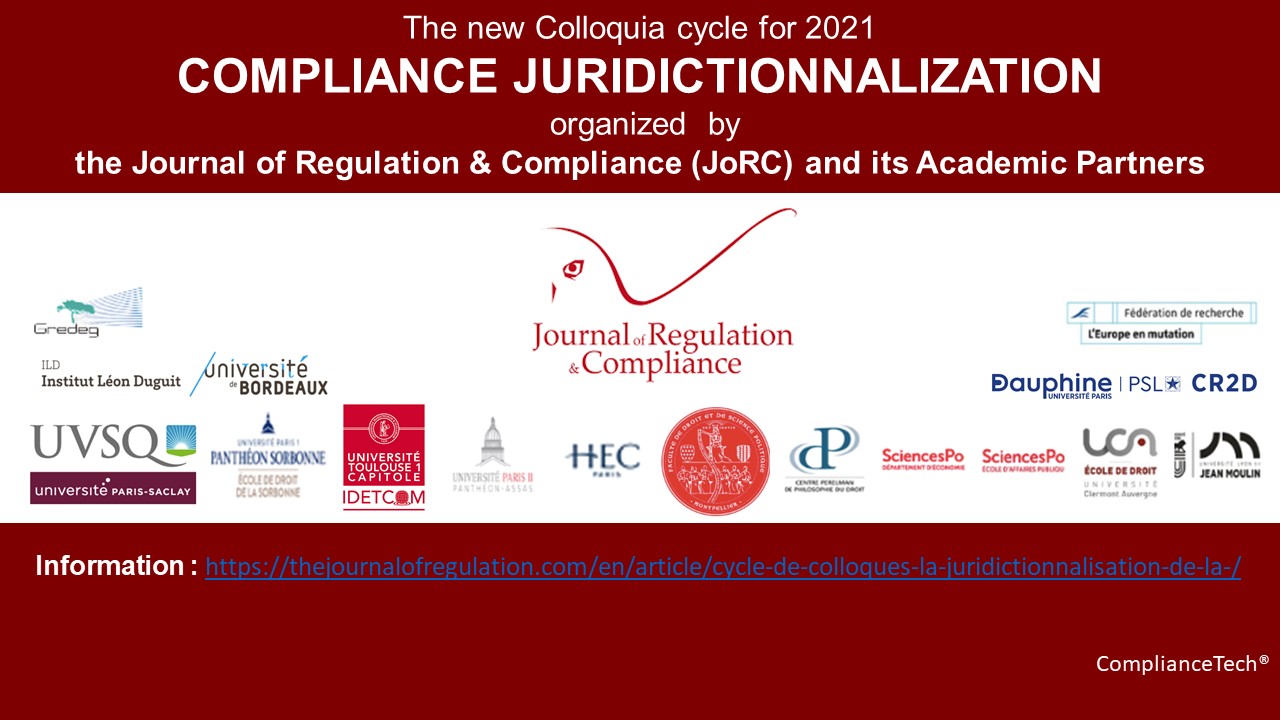
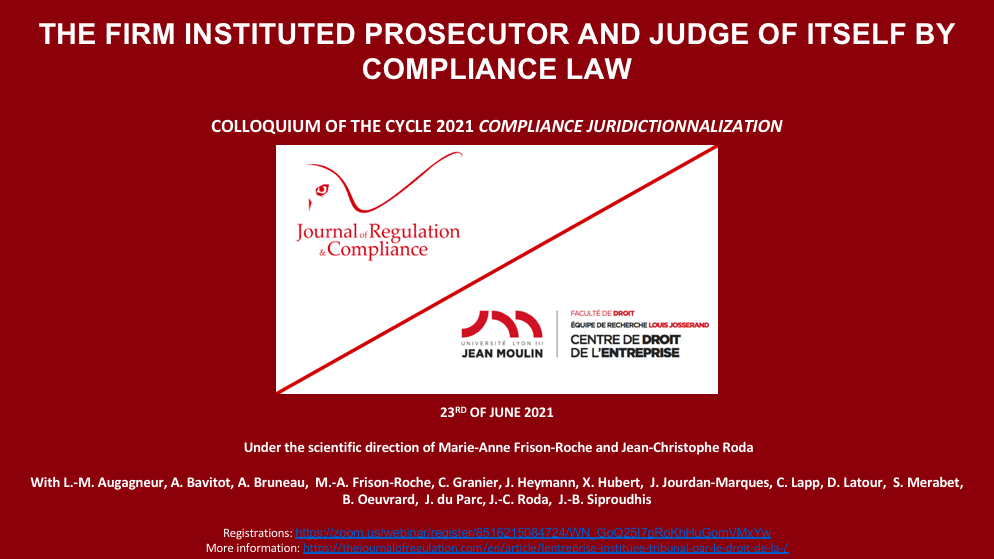
►The interventions will be then transformed into a chapter in the books:
📕 La Juridictionnalisation de la Compliance ,
📘Compliance Jurisdictionalisation, 
____
This colloquium will take place in Lyon 3 on 23rd of June 2021 with a limited audience. It will also be broadcasted in live on Zoom.
To register: https://zoom.us/webinar/register/8516215084724/WN_GoQ25I7pRoKhHuGomVMxYw
► Presentation of the topic: Initially, it was through Criminal Law, inseparable from the trial, which forced companies to take charge of monitoring within themselves behavior likely to be deviant, the requirement of Ex Ante to be designed by the 'Ex Post of the jurisdictional. From this reversal of things, there has always remained this presence of the judge and the prosecution bodies in a Compliance Law which is nevertheless defined by its concern for the future and the Ex Ante tools within the company.
In doing so, the company becoming on the one hand a judge of itself, on the other hand a prosecutor of itself, it splits up, taking in reverse the most established procedural principles. Moreover, because of the monumental goals which constitute Compliance Law, companies become attorneys and judges of the others, or for the others, the cutting machines and the "supreme courts" being by name instituted to regulate in Ex Ante all different before that it does not become litigation. The Ex Ante of Compliance would then make the Ex Post disappear.
► Method:
The colloquium which had to take place initially on 8th of April has been postponed to 23rd of June to enable speakers to meet and talk in face to face, with a limited audience.
These exchanges will be captured so that third parties can benefit from them, even before the publication of the works, La Juridictionnalisation de la Compliance and Compliance Juridictionalization, within which this work constitutes the basis for the development of a specific chapter.
Five practical cases will first be examined in five specific sectors, where this institution of the firm as prosecutor and judge of itself is particularly observable before both specific and more cross-sectoral themes are examined and discussed.
►speakers :
🎤 Luc-Marie Augagneur, Attorney before Lyon Court of Appeal, CVS Law Firm
🎤Ale xis Bavitot, Senior lecturer at Lyon 3 University
🎤 Alain Bruneau, Chief compliance officer at Natixis
🎤 Jean-Marc Coulon, Head of Legal Infrastructure at Bouygues Construction
🎤 Marie-Anne Frison-Roche, Director of the Journal of Regulation & Compliance (JoRC)
🎤 Cécile Granier, Senior lecturer at Lyon 3 University
🎤 Xavier Hubert, Director of Compliance at Engie
🎤 Jérémie Jourdan-Marques, Professor at Lyon 2 University
🎤 Jérémy Heymann, Professor at Lyon 3 University
🎤 Daphnée Latour, Attorney, DL Avocats, Paris
🎤 Christophe Lapp, Founding partner of Altana law firm
🎤 Samir Merabet, Senior lecturer at Lyon 3 University
🎤 Béatrice Oeuvrard, Public Policy Manager at Facebook France
🎤 Jean du Parc, Bâtonnier
🎤 Jean-Christophe Roda, Professor at Lyon 3 University and director of the Centre de droit de l'entreprise (Center of Company Law)
🎤 Jean-Baptiste Siproudhis, Director Ethics, Integrity and CSR at Thalès
May 17, 2021
JoRC
This scientific manifestation is placed under the scientific direction of Marie-Anne Frison-Roche, Pascale Idoux, Antoine Oumedjkane and Adrien Tehrani. It is organized by the Journal of Regulation & Compliance (JoRC) and by the Faculté de Droit et de Science Politique de l'Université de Montpellier (Centre de Recherches et d'Etudes Administratives de Montpellier and Centre du Droit de l'Entreprise).
📅 This manifestation is part of the cycle of colloquia organized in 2021 around the general topic of Compliance Monumental Goals.
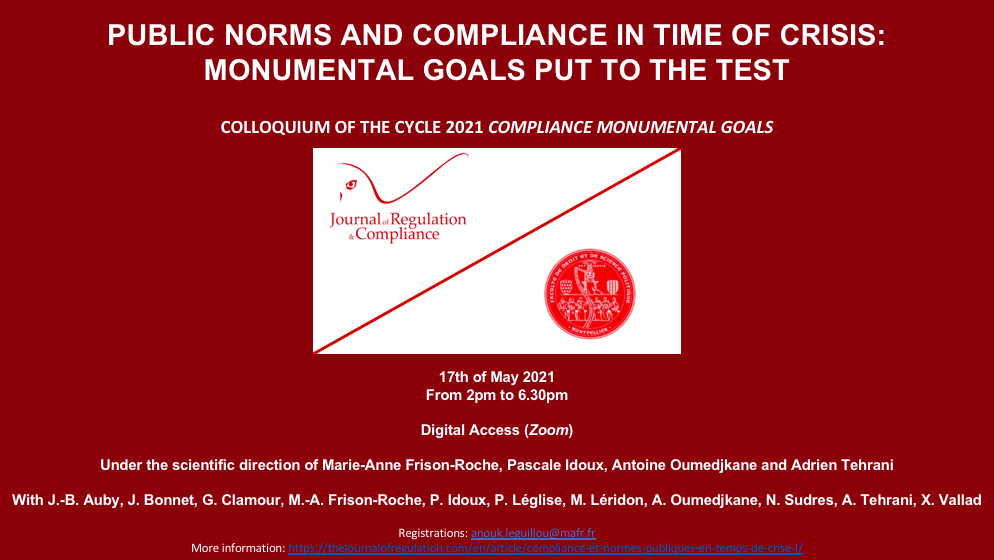
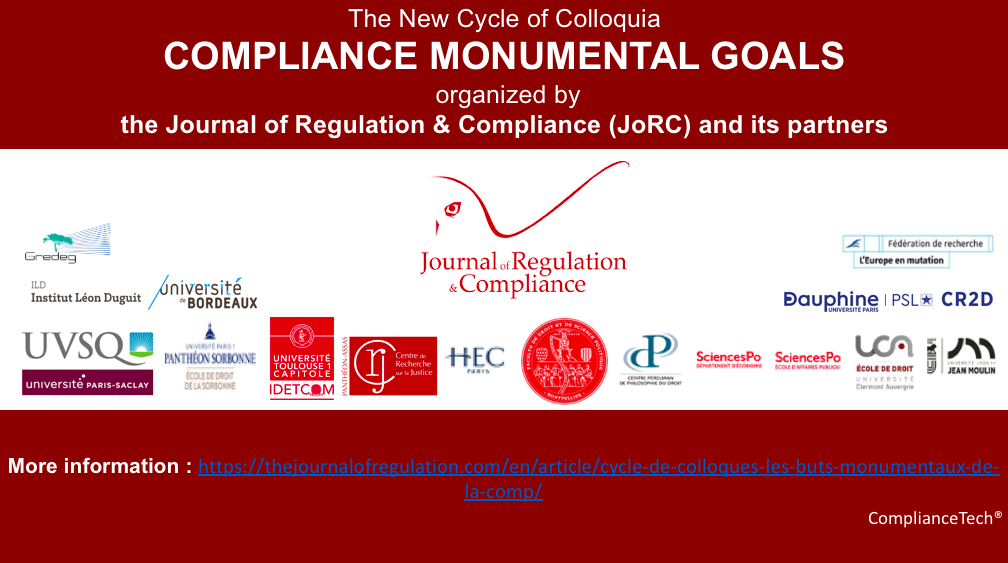
The interventions will give rise to the production of articles which will be part of
📕 Les bus monumentaux de la Compliance, 
📘Compliance Monumental Goals, 
This manifestation took place on Zoom on 17th of May 2021.
Registrations: anouk.leguillou@mafr.fr
Assistance to this event may be validated as part of the continuing education of lawyers.
In addition, scientific videos will be extracted and disseminated later.
Presentation of the topic: In the overall problematic of "Monumental goals", this conference retains a particular case: that of the crisis and the emergency situation that it generates.
First of all, in general, does the importance of public norms in the emergency context engendered by a crisis situation imply a marginalization of Compliance? Don't private actors also have their place in these circumstances, at the service of the "monumental goals" that the public authorities want to maintain, or even which appear specifically?
Secondly, more concretely, we have been living for many months in a health crisis. By taking it as a framework and, within it from particular cases, how public and private actors react, act, adjust? and how do the courts assess these movements?
Going from the most general to the most specific, this conference aims to identify criteria, limits, of what could be specific rules when the emergency of a crisis meets Compliance, and will examine specific situations.
Working method: The conference is therefore built on a general issue, which was the subject of a "working paper", written by Antoine Oumedjkane, Adrien Tehrani and Pascale Idoux, on which the speakers will have thought in advance and from which they are intended to study the question from their particular perspective.
The conference, which is essentially interactive, therefore begins with an outline of the main lines of this general work. It is followed by the examination of concrete practical cases.
They are as follows:
1️⃣ hydro-alcoholic gel, its manufacture, price, availability,
2️⃣ information and regulation on all media in Covid period
3️⃣ the use of the bicycle during the state of health emergency
A first conclusion, thematically limited, will relate to Revealed by the crisis situation, the place of private initiative in Compliance Law.
A second, more general, undoubtedly open-ended conclusion is drawn from this confrontation between general reflection and concrete cases which must be resolved in a particular crisis.
speakers:
🎤 Jean-Bernard Auby, Emeritus Professor of Sciences po (Paris)
🎤 Julien Bonnet, Professor at Montpellier University and member of the CERCOP
🎤 Guylain Clamour, Dean of Montpellier Law School
🎤 Marie-Anne Frison-Roche, agrégée des Facultés de droit, Professor of Regulation and Compliance Law at Sciences Po (Paris) and Director of the Journal of Regulation & Compliance (JoRC)
🎤 Pascale Idoux, Professor at Montpellier University
🎤 Pascale Léglise, adjointe au directeur des libertés publiques et des affaires juridiques (Deputy Director of Civil Liberties and Legal Affairs) of the Ministère de l'intérieur (Home Ministry)
🎤 Michèle Léridon, Member of the Conseil supérieur de l'audiovisuel (French Media Regulator), President of the working group Pluralisme, déontologie, supervision des plateformes en ligne (Pluralism, Deontology, Supervision of Online Platforms)
🎤 Antoine Oumedjkane, Researcher of the Centre de recherche et d'études administratives (Research and Administrative Studies Center) of Montpellier University
🎤 Nelly Sudres, Maître de conférences at Montpellier University and member of the Centre de Recherches et d'Etudes Administratives (Research and Administrative Studies Center) of Montpellier University
🎤 Adrien Tehrani, Professor at Montpellier University and member of the Centre du Droit de l'Entreprise (Company Law Center)
🎤Xavier Vallad, Group Legal Director, Intermarché
⤵️Read a more detailed presentation of the manifestation below:
Sept. 23, 2021
JoRC
►This scientific event is placed under the scientific responsibility of Marie-Anne Frison-Roche, Juliette Morel Maroger and Sophie Schiller. It is organized by the Journal of Regulation & Compliance (JoRC) and by the Centre de recherche en Droit (CR2D) of Paris Dauphine-PSL University.
This event is part of the 2021 colloquia cycle around the general theme of Compliance Jurisdictionalisation.
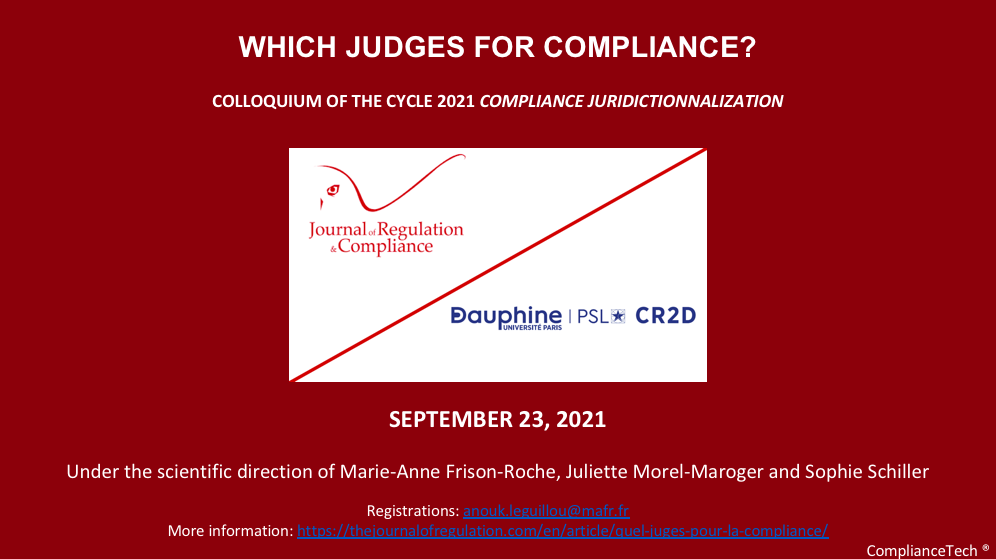

►The interventions will be then transformed into a chapter in the books: contributions in the 📕 La Juridictionnalisation de la Compliance , to be published the Regulation & Compliance series ries, jointly published by the Journal of Regulation & Compliance (JoR)C and Dalloz
📘Compliance Jurisdictionalisation, 
____
This colloquium will take place in Paris Dauphine-PSL University in September 2021.
Presentation of the topic :
Judges, regulatory and supervisory authorities, or even authorities specially instituted by Compliance Law, such as the Agence Française Anticorruption (French Anticorruption Agency), must implement it.
The colloquium aims initially to identify and discuss the procedural rules that they then specifically implement, in particular when the strong requirements of Compliance Law, efficiency and immediacy, new negotiation techniques and commitment, must be articulated with the traditional procedural requirements that remain.
The question arises in particular as to whether the rules of a fair trial should apply (or can they be similar in transactional procedures and in the context of judicial procedures, and how the control by judges operates during homologation) in transactional procedures, with more or less specific treatment of the evidence used.
Secondly, the colloquium considers the way in which the different judges assess the different constitutive standards of Compliance Law. These are often soft Law and depending on whether the judge is repressive, administrative, or European, his or her assessment will not be legally of the same scope or of the same nature, which together leads to an issue of articulation of method. Due to the breadth of the subject, certain sectors will be particularly examined, in particular the banking sector.
Thirdly, the way in which the judge himself or herself applies Compliance Law will be examined, in what appears to be a balance between pedagogy and sanction. It then appears to play a triple role, in that it ensures compliance with standards but also in that it must find effective solutions in a Law which is more in Ex Ante than in Ex Post and that it must support operators so that they act effectively, by mastering their obligations. The motivation for decisions then appears to be a primary issue.
Because this last phase concerns the even more direct relationship between the judge and the operators and stakeholders, this theme is intended to give rise to a presentation and a round table.
______________
Will speak notably:
- Claudie Boiteau, Professor at Paris Dauphine-PSL University, Member of the Centre de Recherche en Droit de l'Université Paris Dauphine-PSL (CR2D).
- Jean-François Bohnert, Financial National Prosecutor
- Olivier Catherine, Secretary General at Sonepar
- Nicolas Cayrol, Professor at Tours Law School and Director of the Institut d'Etudes Judiciaires François Grua
- Jean-Michel Darrois, Attorney, Darrois, Villey, Maillot, Brochier Law Firm
- Marie-Laure Denis, President of the CNIL
- Eric Dezeuze, Attorney, Bredin Prat Law Firm
- Marie-Anne Frison-Roche, Professor at Sciences Po (Paris), Director of the JoRC
- Juliette Morel-Maroger, Professor at Paris Dauphine-PSL University
- Sophie Scemla, Associate attorney, Gide Law Firm
- Sophie Schiller, Professor at Paris Dauphine-PSL University
Read a more detailed presentation below:
Oct. 14, 2021
JoRC
►This scientific manifestation is placed under the scientific responsibility of Marie-Anne Frison-Roche and Lucien Rapp.
This manifestation is organized by the Journal of Regulation & Compliance (JoRC) and by the IDETCOM of Toulouse-I-Capitole University.
📅 This colloquium is part of the cycle of colloquia organized in 2021 around the general topic about Compliance Monumental Goals
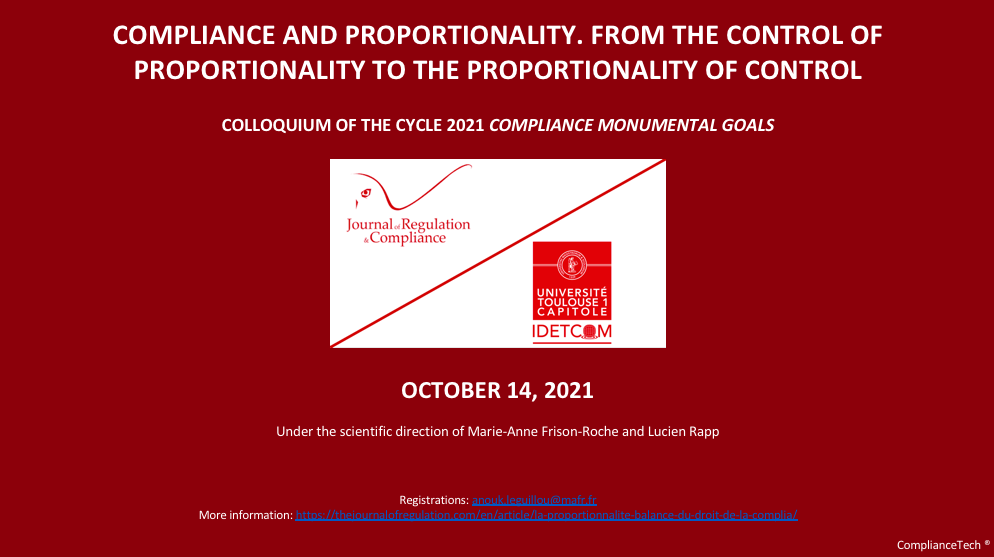

____
► Interventions during this colloquium will be the base for a specific chapter in :
📕 Les buts monumentaux de la Compliance, 
📘Compliance Monumental Goals, 
____
The colloquium will take place, a priori, on site in Toulouse, on October 14, 2021.
It will be broadcasted in live online.
🎥 Videos will be extracted.
► Presentation of the topic :
Compliance Law tends towards "Monumental Goals". This puts the concern, the calculation and the control of proportionality at the center. Proportionality is one of the most common references for compliance practices and strategies, but paradoxically, one of the least well defined. Perhaps even one of the most elusive.
For the German Federal Constitutional Court in Karlsruhe, the principle of proportionality allows the quantitative easing policies of the European Central Bank (ECB) to be monitored. This principle is linked to nothing less than the principle of democracy and is the basis of the control of ultra vires. In French law, proportionality refers to the provisions of Article 8 of the Déclaration des droits (Bill of Rights) of 1789, according to which the law should only establish penalties that are strictly and obviously necessary. In many areas of civil or business life, the compliance of behavior and the consequences of non-compliance are assessed on the basis of a graded assessment by the censor (competitor, regulator or judge).
Proportionality calls for action, which opens up a margin of appreciation to take into account the facts or circumstances. It also allows for the exercise of control over abuse of rights or excess of power. It goes beyond the office of the judge or the censor to forge one of its tools: the control of proportionality, which is obviously not the proportionality of the control.
How to integrate proportionality into compliance practices and strategies?
Does it introduce a certain tolerance in the assessment of situations and is it thus a factor of rediscovered freedom in the development of risk matrices?
Conversely, is it not synonymous with increased vigilance on the part of compliance officers, by leaving open the possibility of a reinforced control of their acts or decisions, by the evaluation of their advisability and not of their conformity alone?
► Working method:
🚧 The colloquium is built around 4 topics, which would be prepared in 4 working papers.
🚧 The writing of each working paper will have been entrusted by experts.
Secondly, these working papers will be available to be criticized by two practionners of Compliance technics.
For each topic, there will be these three sequences:
- Presentation of the topic by the author of the working paper ;
- Discussion by the two discussants, who will have read the working paper previously ;
- Discussion with the public onsite and online.
The four topics chosen are:
1️⃣ Proportionality and Conformity
2️⃣ Proportionality and Evaluation
3️⃣ Proportionality and Normativity
4️⃣ Proportionality and Sanction
► registrations and information :
- attendance to the manifestation is free, onsite or online
- every registration for an attendance onsite will be supported by Toulouse-I-Capitole University
- information will be available on a website opened by Toulouse-I-Capitole University
____
►Will speak, notably :
🎤 Marie-Anne Frison-Roche, professor of Regulation and Compliance Law, director of the Journal of Regulation & Compliance
🎤 Alexandra Mendoza-Carminade, professor at Toulouse-I-Capitole University
🎤Lucien Rapp, professor at Toulouse-I-Capitole University
🎤 Marc Segonds, professor at Toulouse-I-Capitole University
____
See the program below:
